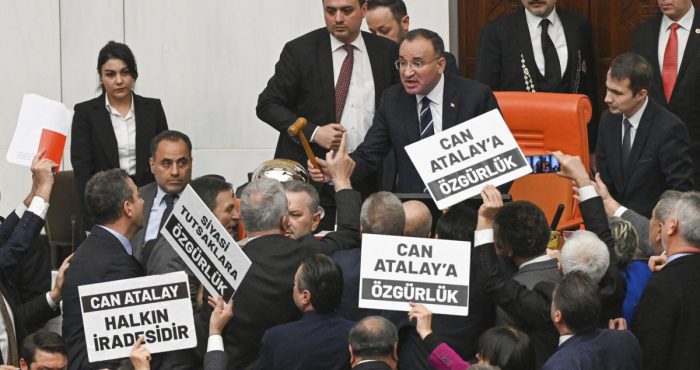The most striking aspect of the Common Policies Consensus Document (CPCD) announced by the opposition parties’ coalition, known as the Table of Six, on January 30 2023 is perhaps the fact that “law, justice and [the] judiciary” appears first, “public administration” second and “anti-corruption, transparency and audit” third in the document’s list of common policies. This shows that the leaders of the six coalition parties, who highlighted “arbitrary and noncompliant wild governance” in the first paragraph of the text are prudent enough to prioritise the country’s fundamental problems, regardless of the criticisms that may be levelled against the policies, goals and programs described under these headings.
Indeed, the reason that our people’s sense of justice in our country is crumbling is that our judiciary is incapacitated; it cannot perform its duties without restraint; ruling politicians are untouchable, and it is literally impossible to investigate the offences of public officials if not consented to by ruling politicians, as the Constitutional Court ruled that the negligent public officials who have caused to the Soma Mine Disaster drowning 301 miners and who gave illegal instructions to conductors in the Pamukova train disaster killing 42 lives had not been brought before justice. This situation is starkly reflected in the arbitrary and unaccountable governance, unmeritocratic state, and offences of nepotism, corruption and bribery that we face in our daily lives.
The Executive Stability Justification
The second paragraph of the consensus document correctly identifies that there are “issues threatening the survival of the state”. However, it is not the current presidential system as claimed in the CPCD, but the long since deteriorating condition of our state which compromises everything in the name of executive stability and treats the judiciary as mere accessory. Nonetheless, the presidential system has worsened our state system and brought more instability while trying to solve the problem of stability, partly by vesting all state powers in a single person. As a matter of fact, it was only possible to introduce the current presidential system by controversial Supreme Election Council (SEC) decision, made by the slimmest of margins, in response to the 2016 coup attempt under a State of Emergency. This was done in response to “issues threatening the survival of the state” that already existed under the parliamentary system.
It is a brutal fact that Turkey’s state system has been lurching from a faulty democracy towards autocratic despotism since 1980 in the name of “[the] stability of the executive”, a fact that foreign institutions that flourish in liberal democracies brandish in our faces, but which an important section of people chooses to ignore. As I put forward in my previous article , in order to reverse this course of decline and solve our “middle democracy” problems it is crucial that we transform the judiciary into being capable of providing a quality service, make it fully independent, and ensure fair representation of the people in the legislature.
The need for the balancing of state powers
To protect and sustain the balance between the legislature and the executive, it is essential that executive powers be divided into three meaningful groups: permanent policy councils, independent regulatory institutions, and executive ministries, and in doing so the enormous executive power must be spread across a broader segment of the state bureaucracy. Whether it is the president, or chief executive directly elected by the people, or the prime minister and ministers appointed by parliament, parliament must possess the capacity to supervise the executive power and remove them from office if and when necessary. Instead of being held captive by unstable governance in the name of “stability”, it should be ensured that there are no gaps in governance. Gaps in governance must be eliminated instead of the persistence of the belief in unstable governance in the name of “stable governance”.
Judicial independence and the Ministry of Justice
The Table of Six previously expressed its pledges under these three headings, and has also sagaciously made clear that they are prioritising these issues on other occasions.
The constitutional package that was previously introduced included the division of the Council of Judges and Prosecutors (HSK) into a Council of Judges and Council of Prosecutors; the exclusion of the Minister of Justice and his undersecretary from the Council of Judges; the establishment of these boards through the pluralist method of elections in Parliament; judicial review of admissions to the ranks of the judiciary and state prosecutors, and disciplinary actions against members of the same; repositioning prosecutors from the judge-equivalent status they currently enjoy in court to one equivalent to the defence; the abolition of the multiple bar association system; the introduction of guaranteed tenure for “judges reserved to the first class” and “first-class” judges; the establishment of a judicial law enforcement system for the purpose of executing lawful warrants similar to Marshals in the US or bailiffs in the UK, etc.
Abolishing the statute of limitations on corruption offences is a new and positive pledge; it should be expanded to bring offences committed by all public officials and other untouchables into its purview, and be strengthened by abolishing the requirement for superiors’ consent for the prosecution of such persons.
What are the new pledges?
The following are elaborations on previous pledges: ensuring pluralism in the selection of members to the Constitutional Court, preventing the selection of members through a collusive unmeritocratic election process, expanding the scope for individual human right violation complaints and authorising the Constitutional Court to annull provisions of legislation that violate human rights.
The “new” promises that caught my attention are as follows:
- Lowering the electoral threshold to 3 per cent and providing financial aid from the treasury to parties that receive 1 per cent of the votes in the most recent election;
- Representation of citizens abroad with 15 members of parliament and the creation of an overseas electoral district for this purpose;
Ending the uses of omnibus laws - Strengthening the requirements for the closure of political parties by requiring prior notification of and the authorisation from Parliament to initiate closure proceedings;
- Detailed regulation of political financing within the framework of the principles of transparency, auditability and transparency of election expenditures, public disclosure of donations to political parties and all expenditures during election periods;
- Strengthening freedom of the press, restructuring the Turkish Radio and Television Corporation (TRT) and the Anadolu Agency (AA) according to the principles of independence and impartiality, making media ownership and financing transparent, preventing monopolisation and cartelisation of the media sector, ensuring pluralism in the media, and authorizing the Turkish Competition Authority (TRK) to conduct fully independent examinations with regard to this.
Shortcomings: abuse of authority
The CPCD pledges to apply a “Casuistic” methodology to all the wrongs it proposes to right. This pledge was developed, for example, to prevent a reoccurrence of the mistake in the selection of Hakan Fidan to the constitutional court. On the other hand, while authorising the institutions that take macroeconomic decisions to be independent and empowering their executives, measures have not been envisaged to prevent them from abusing or arbitrarily using their powers … I see this aspect as a significant shortcoming of the powerful economic promises made.
Are not the governors of independent institutions who by virtue of extraordinary protection they are offered were able to act arbitrarily and abuse their power? What guarantee is there that the same arbitrary decisions will not be taken by the governors who will be granted similar protections by the Table of Six? I find it regrettable that the opposition bloc, which emerged with the promise of a transition to a new and better system, has not developed a proposal for a safer and more stable system to replace the system that was created under the conditions of the early 2000s but deteriorated towards the 2020s.
Inconsistencies
This document that was so labouriosly drafted and which takes hours to read is not easy to understand by any means. I would have expected the Table of Six to identify coherent policies and objectives when drafting the CPCD, followed by smart goals, and to propose specific actions or projects for achieving the targets, with criteria for evaluation, which would have resulted in a more readable text. This preparation would have made their objectives clearer and more realistic, which would have in turn increased trust among the voters by providing a source of accountability.
The need for wise leadership
One of the most important aspects of the document, and the one that drew my attention the most, was evident even in the style of writing used. That is, the lack of a united and wise leadership which prevents them from determining easily achievable and common goals.
As the election date draws even closer, the Table of Six needs to revise the text of the CPCD under such wise leadership. The six leaders and the teams they put to work on this stand to gain much from such an endeavour.
A shorter text that is easy for the public to understand and that the presidential candidate can agree to and adopt willingly could increase the opposition’s chances of winning and eliminate the possibility of a fiasco in the coming election time.
p.s. Special thanks to Charles Ediz Gün for this English translation




